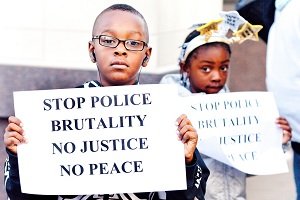
Law enforcement misconduct is a problem that should be acknowledged and then solved. Brutality takes the first position among all forms of misconduct (19.4%) while followed by sexual harassment (10.9%). If we take a look at the possible reasons, we’ll hardly find many valid explanations. Thus, about a half of the police officers believe they are the instruments of justice, not the system; 84% of all police officers have witnessed the use of excessive force by their colleagues and over a half of them cover fellow officers by pretending that they did not notice any misconduct.
A 1994 Violent Crime Control and Law Enforcement Act makes it obligatory for the government to collect and keep data on excessive force use by the police. However, the only official data that were available until lately was 400 “justifiable homicides” every year in 2008 through 2012. There is no centralized body that would collect data, maintain and process it. NGOs and social initiatives fill in the gap on their own.
Thus, The Guardian launched a project The Counted, in which the data on people killed by the police are monitored and collected. According to it, 823 people were killed in 2015 by September 16. In 2014, another resource stated 1,149 deaths caused by police officers. Oklahoma, New Mexico, Wyoming, Arizona, West Virginia are the leading states by number of fatal victims per capita. Los Angeles, Houston, and Phoenix are three cities with the biggest numbers of casualties.
Police brutality not only causes physical and psychological damage to people and their families, but it also costs the taxpayers up to $2 billion which is spent on settlements in court. Police brutality is not just a problem, but it is often added to the racial and other social issues. For example, it has been found that twice as many unarmed people of color are killed by officers as white people.
The American society is trying to deal with the problem of police brutality. Thanks to media initiatives, we are now able to obtain data on instances of police misconduct; thanks to individual citizen, video evidence is available; and thanks to change advocates, police officers are wearing video cameras themselves. According to Robert Bogle of The Tribune, it is not enough. He believes that the police should be trained more as part of the community, while members of this community should participate in crime prevention themselves.
We hope that the problem with the police, who exercise their authority and power at the cost of an ordinary citizen, will be resolved soon. Maybe it will somehow change as a result of surveillance cameras, or due to proper training. What is needed now is solid statistics which will be available to everybody from around the world so that the police remember they are watched all the time.
